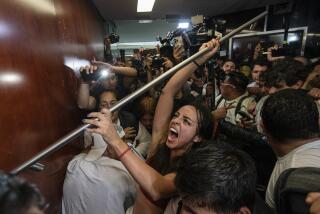Mexican Army Officers’ Protest Is ‘Wake-Up Call’ for Military
- Share via
MEXICO CITY — Using the Internet and street marches, a small band of dissident army officers has staged unprecedented protests against the Mexican military hierarchy, flouting a tradition of silent obedience by the nation’s soldiers.
The protest began Friday, when Lt. Col. Hildegardo Bacilio Gomez led about 50 soldiers, wearing dress uniforms, down the capital’s main avenue, Paseo de la Reforma, in a traffic-stopping march against what they call the “obsolete, absurd, corrupt, painful and ignorant” system of military justice.
Although the numbers involved are small, political analysts said the surprise emergence of organized, public opposition is significant within one of the few apolitical military forces in coup-prone Latin America.
Roderic Ai Camp, a respected analyst of the Mexican military and a professor at Claremont College, called it “so exceptional as to be extraordinary.”
“The Mexican military doesn’t have incidents where dissident officers ever express themselves publicly,” Camp said. “I think it’s a wake-up call for the military that it can’t keep suppressing dissident opinions.”
Bacilio, not previously a public figure, and other marchers said many of them face courts-martial on a variety of charges, including insubordination, that have dragged on for years. They called on the government to end the secretive system of military trials even for minor offenses and to bring the military in line with the democratic transition taking place in many Mexican political institutions.
The Defense Ministry responded Sunday that those who joined the protests would face new, serious charges and that disobedience would not be tolerated.
But the campaign by the self-styled “Patriotic Commando to Raise the Consciousness of the People” kept up its vocal skirmishing in a fashion more often associated with Subcommander Marcos, the loquacious leader of the Zapatista rebels in the southern state of Chiapas.
In communiques over the weekend issued on the Internet and faxed to news media, Bacilio called on the nation’s generals to refuse to accept a civilian-appointed defense secretary--and instead to elect their own. He also demanded changes in the free-market economic model that has meant that “Mexico . . . is in flames, living a Dantesque inferno.”
Bacilio cited Marcos and Northern Ireland leader Gerry Adams in calling for a new economic policy that would end the unequal distribution of wealth in Mexico. And he quoted the promise of Venezuelan President-elect Hugo Chavez to end corruption in that country and introduce humanitarian capitalism.
Among the 15 pages of communiques was Bacilio’s resume, showing him to be a 43-year-old army surgeon with six children and a master’s degree in prenatal medicine.
Columnists noted that Chavez, who coincidentally arrived in Mexico on Monday for talks with President Ernesto Zedillo, was a former military officer who led a violent, unsuccessful coup attempt in Venezuela in 1992.
Julio Hernandez Lopez, writing Monday in the left-wing Mexico City daily La Jornada, said he worried that Bacilio not only expressed sympathy for Chavez but also addressed political issues beyond the scope of a military officer.
Hernandez Lopez added, “There is a great need, certainly, that the taboo theme of the military be opened up in these new Mexican times, but it is also necessary to know what is behind such a peculiar movement.”
Claremont’s Camp said officers had challenged the military individually in the past but never in an organized way. Camp, who recently addressed the Mexican Army College on how it could respond to the democratic transition occurring in the country, said reform of the archaic military justice system is a key issue.
He said the Mexican government has long maintained a hands-off approach to the armed forces, allowing the military to manage its own affairs as long as it remains loyal to civilian rule. The protest, Camp said, suggests that “Zedillo needs to concern himself more with what’s going on in the military and the potential consequences it might have, both for the military itself and for the relationship between civil and military authorities.”
More to Read
Sign up for Essential California
The most important California stories and recommendations in your inbox every morning.
You may occasionally receive promotional content from the Los Angeles Times.













